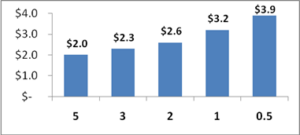Sales Engineers Enable Higher Sales Per Rep
Companies often deploy Sales Engineers (SEs) to help demo and customize technical solutions. SEs are considered overlay as they typically are tied to one or more Rep quotas. Deploying SEs is therefore an added cost to the sales force. Are they worth it? To find out, we evaluated the sales rep productivity of 100 sales forces in our benchmark database. As expected, companies with higher SE to rep ratios have higher revenue per rep. On average, sales forces with a 1:5 ratio (1 SE for 5 reps) have revenue per rep of $2M, while sales forces with a 1:1 ratio average $3.2M per rep. (see chart below).
Does this mean you should hire more SEs? The answer depends on a variety of factors. To determine the optimal ratio of SEs to reps the following factors should be evaluated:
- the complexity of the product or solution
- the maturity of the product or solution
- the bandwidth of the sales rep (how many other products or solutions do they sell or represent?)
- the length of the sales cycle
- the typical deal size
- the size of the customer
- the SE role (pure pre-sales or hybrid pre/post-sales responsibilities)
Ideal SE-to-Rep Ratio
For complex solutions sold to top Enterprise customers, sales reps are typically paired 1 to 1. Large global account reps may even have multiple SEs supporting them. However mid-market reps are typically paired 1:2 or 1:3, and certain solutions may only call for one SE for every 5 or 6 reps. Best practice companies evaluate their SE roles, headcount, and deployment ratios on a regular basis, making sure that the investment in these highly skilled resources is realizing the desired return.
Types of Sales Engineers
In the sales process, different types of Sales Engineers play crucial roles in ensuring success.
- Pre-sales engineers focus on the early stages, conducting product demonstrations, handling technical queries and crafting tailored solutions alongside sales reps to meet client needs.
- Post-sales engineers take over after the sale to ensure clients implement solutions smoothly, providing training and offering ongoing support.
- Hybrid sales engineers manage pre- and post-sales tasks, delivering comprehensive service throughout the entire sales cycle.
Sales Engineers typically specialize in either pre- or post-sales duties, but some perform both roles depending on the organization’s needs.
Benefits of Having Sales Engineers
Sales Engineers provide several benefits that can significantly enhance a sales team’s performance:
Quick Access to Product Knowledge
Sales Engineers offer immediate access to in-depth product knowledge, a crucial asset for sales reps. Even though sales teams undergo training, they often face complex, technical questions from prospects. Having a sales engineer on hand allows these questions to be answered swiftly and accurately without involving the engineering team. Doing so ensures that prospects receive detailed explanations tailored to their specific needs.
Effective Product Training
When a sales engineer conducts product training, it becomes significantly more effective. Their deep understanding of both the product and the sales process allows them to train sales reps in a way that connects product features to client needs. This approach improves the reps’ ability to demo the product, showcase how it can benefit potential clients and address pain points.
Clearer Client Expectations
Setting and managing client expectations is crucial. Sales Engineers can clarify what clients should expect from the product or service. Identifying and addressing the client’s needs early helps prevent misunderstandings and misalignment. This clear communication enhances client satisfaction, as they are more likely to be pleased with a product that performs as expected.
Strong Initial Success Strategies
Sales Engineers are key in developing an initial success plan for new clients. They use their understanding of the prospect’s needs to outline the best approach for implementing the product. Whether dealing with straightforward data integration or more complex setups, they provide a clear plan before a client signs the contract. This transparency helps close deals by ensuring clients understand their future experience and what to expect.
Smoother Shift to Customer Success
The handoff from sales to customer success is more efficient with a sales engineer involved. Their customer success experience enables them to effectively bridge the gap between sales and implementation teams. By understanding both the client’s needs and the consultants’ requirements, Sales Engineers facilitate a smoother transition and kick-start the implementation process. This seamless handoff leads to a better client experience and quicker setup times.
Key Performance Indicators (KPIs) for Sales Engineers
To effectively measure the performance of Sales Engineers, consider these KPIs:
- Sales target achievement: Measures how well Sales Engineers hit revenue goals by comparing current results to targets or past performance.
- Demo effectiveness: This measure looks at how well SEs present products and is tracked by the number of prospects who move on to request trials or pilot contracts.
- Demo-to-sale conversion: This KPI evaluates how successful SEs are at turning product demos into sales opportunities.
- Product knowledge: The product knowledge metric assesses how well SEs understand and communicate the product’s features and benefits to demonstrate its value.
- Proofs of Concept (POCs): Important for showing SEs’ engagement and potential for generating sales, this number reflects the number of POCs they manage.
- Technical closure success: This KPI monitors the number of technically completed POCs that have not yet been converted into sales. It provides insight into the effectiveness of the closing process.
- Successful POC conversion: Conversion measures how effectively SEs turn POCs into actual sales, indicating their success in closing deals and meeting revenue targets.
- Keeping up with technical knowledge: Measuring how SEs stay updated on new features and technologies ensures they remain knowledgeable and effective.
- Team collaboration: This KPI evaluates SEs’ contributions to team efforts, including sharing knowledge, mentoring and working together to solve problems.
- Documentation quality: Assess how well SEs document their activities, such as POCs and meetings, to ensure clarity and continuity for the team.
Sales Engineer Best Practices
Sales Engineers can maximize their impact by adopting the following best practices:
- Fully engage with customers to thoroughly understand their requirements and challenges.
- Customize solutions based on detailed customer insights to address their specific needs.
- Collaborate with sales reps to ensure alignment on strategies and customer interactions.
- Optimize presentations to articulate the value and benefits of the solutions you offer clients.
- Stay updated on the latest industry trends and product developments to provide relevant and timely information to clients.

Speak With Our Experts
Whether you're selling to top Enterprise customers, managing mid-market reps, or dealing with global accounts, Alexander Group provides tailored solutions. Contact us to get started today.

